Hey is NOT for Horses (ComedyOpenMic Round 24 Entry)
Have you ever been called a jackass for using the word "hey"? “Hay is for horses,” they say. Then they get mean and ornery and say, "Aren't you glad you're a jackass!" That's not nice. Who are these people? Idiots? Do they not like interjections? Are they not aware that “hey” is a very common term? According to the dictionary:
Word History of the word “Hey”
A word sounding like “hey” has been used in the English language since Middle English times: Middle English “hei” was used to call someone's attention and also to express anger, derision, or opposition. Hei could also be used to urge dogs on during the hunt and to express grief or concern—this was probably a long, drawn out hey. The word possibly originated simply as an imitation of the various loud, meaningless exclamations that people utter when they are surprised or trying to attract the attention of others. Source
There you have it, “hey” has been around for quite some time. It’s not a new word like listicle, froyo or photobomb. But the real question is: Have these hey-haters never heard of homonyms or words that sound the same, but have different meanings? Actually, it turns out that what I was taught in school about homonyms was wrong. I kind of fell down a rabbit hole trying to make heads or tails of homonyms and all the grammatical variants associated with this term. This is what I came up with, but I’m still confused.
Down the Rabbit Hole
A homonym is actually a word that is spelled and pronounced the same, yet has a different meaning (the bark of a dog/the bark of a tree). Homonyms have two cousins: homographs (Spelling is the same, but pronunciation and meaning are different—lead the metal/to lead the verb), and homophones (Meaning and spelling are different, but pronounced the same—two/too/to). Thus, "hay" and "hey" are technically homophones. The English language is littered with these words, but we deal with them, right? We don’t point them out every time someone uses one. I wonder if these hey-haters also say things like this:
You: Have you read this book?
Them: Red is a color.
You: Did you see that movie?
Them: The sea is a body of water.
You: When is this due?
Them: Do is a verb.
Brilliant Retort
You get the idea. The big question is: What irks these people about the word “hey”? I have no idea, but I think people actually stopped complaining about “hey” after some genius came up with a great comeback: “Aren’t you glad you’re a jackass.” Once that retort became in vogue, people seemed to stop being offended by “hey” because they knew if they were, they’d be even more offended by being called a jackass.
Revenge of the Hey-Haters
Perhaps the word “hey” just became more commonplace overtime (See the chart below), so now you don’t hear many people complaining about it. However, those people that are complaining about it are now adding the retort to the original complaint:
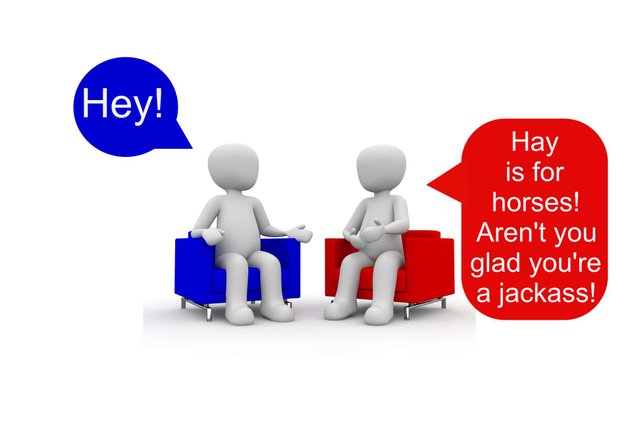
So now the hey-haters are the offensive ones and no one’s come up with a suitable comeback to the original comeback. These newfangled hey-haters are the real assholes. They are just out to offend anyway they can. To continue from the sentences above, I bet this is how they respond all day long to family, friends and coworkers:
You: Have you read that book?
Them: Red is a color, aren’t you glad you’re colorblind!
You: Did you see that movie?
Them: The sea is a body of water, now go drown yourself!
You: When is this due?
Them: Do is a verb, now do me a favor and shut the fuck up!
Hey Now
Now here's something interesting, “hey” is actually more common than “hay”, according to Google Trends. Take that donkey heathen:
Why do we have homonyms
Another perplexing question is: Why do we even have homonyms? Were early grammarians just messing with us? Were they lazy? The spellings of some similar sounding words were changed when used as different parts of speech (Like with hay and hey). For example, “The sky is blue” and “Little Boy blew the trumpet”. Why weren’t the spellings of all similar sounding words changed? And do similar sounding words affect our understanding of the spoken word? Presumably, we can guess the meaning of the spoken word by the context of the sentence, sometimes. I say sometimes because these words probably cause the biggest confusion in our language, especially to these hey-haters. When we say, “Hey,” perhaps they are imagining a huge pile of hay and are worried about running into it or perhaps start salivating and want to eat it?
It’s actually easy to see why people learning English get confused with similar sounding words, just look at the examples below. Imagine trying to learn English when you are confronted with these!
• Did you produce that fresh produce?
• Please record that record.
• Present that present to me.
• Are you content with the contents of this book?
Same spelling, but the stress is different so it’s pronounced slightly differently (homographs). On the flip side, having words that sound the same but are spelled differently (homophones) is very helpful to both non-native and native speakers alike. However, if you are a native speaker of English, you should not be too confused by these sentences (But you should be confused by the buffalo example below). Additionally, at least "hay" and "hey" are spelled differently to avoid confusion when reading the two. But again when spoken, native English speakers can understand the difference between the two by the context of the sentence, right?
The Chart of Homonymic Resonance
At this point you might be saying to yourself, “Wait a second, what’s the difference between a homphone and a homograph and a homonym?” Exactly! That was the question that was bugging me and getting to the answer was actually challenging and it’s the rabbit hole I referred to earlier.
Let’s see if we can figure it out. First, let’s look at the Greek meanings of these words to get to the bottom of this barrel:
• Graph: writing
• Hetero: different
• Homo: same
• Nym: name
• Phone: sound
Now let’s look at this homonym chart:
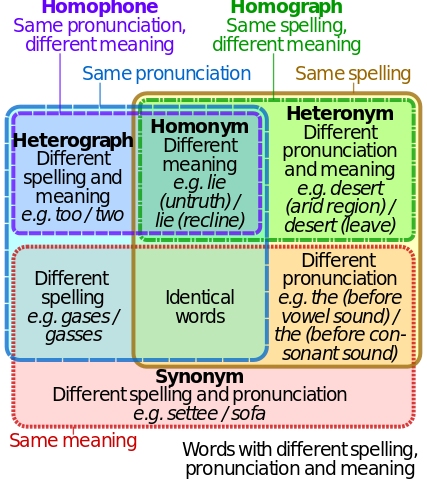
Source
As you can see, homonyms appear in multiple categories, which is confusing as hell, and that chart alone is confusing as hell! According to the chart, "hay" and "hey" would actually be heterographic homophones, I think. But who knows, that chart is harder to figure out than Egyptian hieroglyphs! I mean, how can you have a chart about words that sound alike and look alike and have one word used multiple times to explain multiple categories of similar words! Does that make any fucking sense? Furthermore, you've got heteronyms and heterographs, but no heterophones? Why not? And what is a heterophone? It sounds like a straight dude that likes to use his phone a lot for sexual gratification, but that's just a stab in the dark.
Guess what, there are more terms that aren't listed on the chart. We’ve got capitonyms, which are words that are spelled and pronounced the same, but have a different meaning when they are capitalized (March vs march). And let’s not forget polysemes, which have the same spelling and pronunciation, but slightly different meanings (The mouth on your face, and the mouth of a river). And finally, who could ever forget oronyms, which are phrases that sound alike (Uranus vs. your anus), but I digest (see what I did there).
Look, let’s just keep it stupidly simple: All these words should be called homonyms. You can further classify them as you like, but the general term should be: homonyms!
Buffalos x7
Having said that, I can’t avoid the elephant in the room or dare I say, “Buffalo?” Yes, here’s a noodle knocker for ya: Buffalo buffalo buffalo buffalo buffalo buffalo buffalo. Apparently that is an actual grammatically correct sentence. Realizing this is like that time in the Matrix when the cat was shown twice: There’s a glitch in the system if this fucking sentence of seven buffalos strung willy-nilly is grammatically correct!
I’m sure other languages have similar glitches. I know Chinese, for example, has a poem with the word shi pronounced numerous times using different tones and different characters. They are all pronounced using variants of shi: Lion Eating Poet in the Stone Den. By the way, if anyone ever asks you if you can speak Chinese, just say, “shi” (which actually means “yes” in Chinese), then say, "shi" about thirty times in a row (Hint: It sounds like “shhh” in English).
However, buffalo is spelled and pronounced the same exact way seven times in that crazy sentence. Listen, English words should be spelled differently when they are used as different parts of speech to avoid confusion. For example, “He buried the berry next to Barry.” Or “The witch didn’t know which wich to eat.” Or “In lieu of using the loo, Lou used Barry’s leg.”
Why do we change the spelling of some similar sounding words, but not all of them? I don’t know, but using different spellings of buffalo would help readers understand the meaning of that crazy sentence a bit, ya think? Furthermore, what if the English language suddenly had more homonyms, or whatever they are called, and fewer words. And what if we suddenly started speaking like the buffalo sentence to each other:
Joe1: Yo yo yo yo yo yo YO!
Joe2: Watup watup watup watup watup watup watup!
Joe1: Screaming hairy armadillo armadillo armadillo armadillo armadillo armadillo armadillo!
Joe2: Dawg dawg dawg dawg dawg dawg dawg!
Joe1: Spiny lumpsucker lumpsucker lumpsucker lumpsucker lumpsucker lumpsucker lumpsucker!
Joe2: Dude dude dude dude dude dude DUDE!
Joe1: Satanic leaf-tailed gecko gecko gecko gecko gecko gecko gecko!
Joe2: Fuck fuck fuck fuck fuck fuck double fuck!!!
Talking like that to people would be horrible, but it doesn’t seem to bother singers and rappers.
Misspellings (Why is that word so hard to spell?)
Moving on and back to the gist. Maybe the reason why so many native-English speakers are such bad spellers is because our language has so many different spellings for similar words that are used as different parts of speech; however, the English language is not consistent when it comes to changing the spelling of words that sound alike. There seems to be no rule or noticeable pattern as to why some words that sound alike have a variety of different spellings, while others do not.
Here’s a list of commonly misspelled homophones. I wonder if the majority of misspelled words in the English language are actually homophones? I for one frequently struggle spelling these words.
On a personal note, I once wrote an email to a sales person and asked him to “wave” the extra fees associated with his service. He wrote me back and said he would not “waive” the fees, but he would “wave” me good-bye. Which was funny and taught me how to spell “waive”, but I’m waving him the finger right now, the fucking douche! (Not because he taught me how to spell "waive", but because he didn't waive the extraordinarily large fees). Getting to the bottom of it: Why do we even have words that sound the same and are spelled differently? And vice versa? Shouldn’t we spell all words that sound the same the same, or spell them all differently to be consistent for fuck’s sake! OK, OK, enough ranting.
Back on Track
I lost my train, where was I? Oh yeah, hay and hey.
Anyhoo, this gets me back to the original problem with “hey”. These hey-haters stole our comeback. I tried to find the person who invented the “aren’t-you-glad-you’re-a-jackass” comeback to ask them for another great comeback, but I’m getting like 11 results for “aren’t you glad you’re a jackass” on Google (It initially says 800+ results, but by the second page, almost all the results have vanished—that doesn’t seem very accurate). Come on Google!
We really need to know who this person was who invented this amazing comeback: Aren’t you glad you’re a jackass! He or she is probably turning over in their grave right now at how their catchphrase has been abused. So let’s stand up to the plate. We need some mighty retort that will shut these grammatical idiots up, these hey-haters, and put them in their place for good.
Mama Said Knock You Out
Why do we need a new comeback? Well firstly, “hey” is a common term and these fucks don’t seem to get it. Secondly, they stole the original comeback and now think they are being clever, when in actuality, they are plain rude as fuck. Imagine saying “Hi” to someone and they say, “Fuck you, I’m not high!” Come on, these assholes have to be stopped in their tracks! We need a solid comeback that will shut them up and get them to stop being rude fuckwits. Something like:
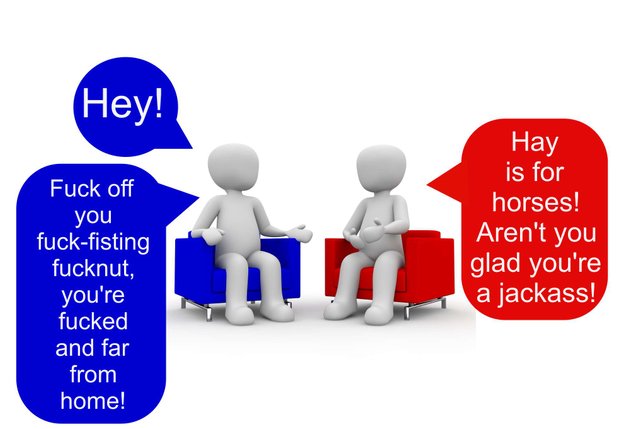
That’s all I got at the moment: Fuck off you fuck-fisting fucknut, you’re fucked and far from home! If you’ve got something better, please comment.
And finally, if you've made it all the way through this marathon post, I salute you!
The End
I nominate @hendrikdegrote and @kevinwong.
Help support @ComedyOpenMic by voting COM as a witness. Click here, enter in @ComedyOpenMic in the space provided, then click "Vote".
For more stories, please visit Groovatti.com.
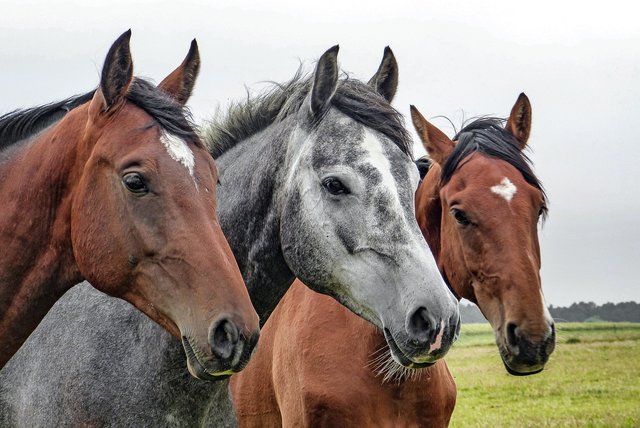

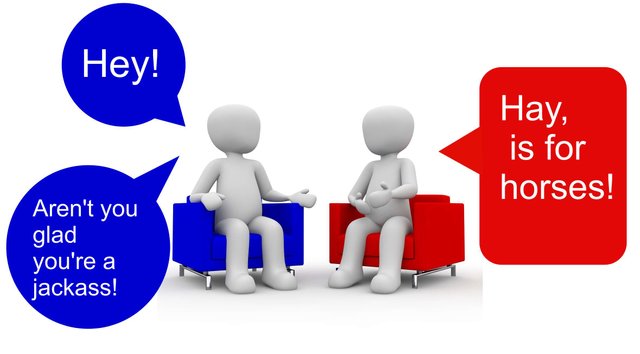
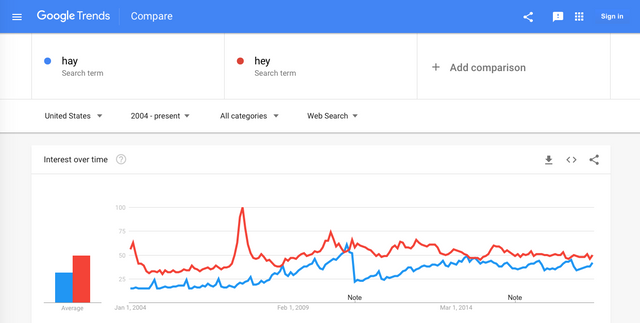

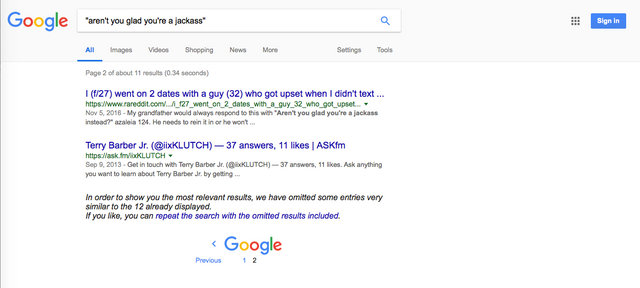
Orange you glad to see me?
Oh shit wrong post.
hahahaha
I think you have covered EVERYTHING that could ever be said about homonyms! 😁
Love the Homonym chart ~ such a handy tool!
Wow @groovatti, this is an absolute masterpiece. @comedyopenmic, someone needs to nominate this for a @curie.

One solution to this problem would be to learn Spanish.
Also:
Hay = heno
Hey = oye
Problem solved...
Peace/Piece/Pees
Thanks @bobaphet!
Does that pic mean there are 16 words in Spanish for "read"? Are they conjugations of several verbs?
Is that the same "oye" from "Oye como va?"
Haha @groovatti, I can't even explain it in English properly, using the correct words, without compounding the confusion, but kind of like this.
I reed, I red, he reeds, he red. you reed, you red, they reed, they red, we reed, we red, et:
and Yes, for the Oye como va :)
Peace.
Ha, that's a lot verbiage!
Great song btw
Congratulations @groovatti! You have completed the following achievement on Steemit and have been rewarded with new badge(s) :
Click on the badge to view your Board of Honor.
If you no longer want to receive notifications, reply to this comment with the word
STOPI love this post, @groovatti. Really well done and that buffalo sentence just blows my mind.
Thanks @take5!
Yeah, I still can't wrap my head around that sentence.
Btw, I've been thinking about the "hay" jackasses and I'm not really good with comebacks, so what do you think of this?
Person 1: Hey
Jackass: Hay is for horses! Aren't you glad you're a jackass!
Person 1: Well, you know what they say about jackasses {wink}.
Jackass: What?
Person 1: You tell me, smartass!!
Or something along those lines. And if they don't take the bait, you can just give that amazing comeback you have at the end of your post (that's probably the best response to jackasses).
Ha, I like it!
Hi groovatti,
Thank you for your entry in to #comedyopenmic comedy contest. We have asked the judges below to review your entry and give it a funny rating, this will determine your ultimate position when the results are tallied.
Judges:
If you have any questions or quieries please feel free to contact one of the judges or come say hi in discord: Click Here
Thank you to @matytan for the great banner
Bye isn’t for people who’d have sexual intercourse with both genders.
Exactly!
I am the world's worst speller. Your article was very detailed and I loved the comebacks.
Me too and I think homonyms are partially to blame because spellcheck never catches them. Also, my first grade teacher wasn't so good in teaching spelling. I remember if you got a 100% on your weekly spelling bee, the teachers would adhere a cutout apple with your name on it onto a big cutout tree. I clearly recall walking by the other 1st grade classrooms and their spelling trees were loaded with apples, while my class's tree was not.
Another reason is we spell words like they sound which is great if you're Italian because apparently all their words are spelt like they sound. However, English has a lot of words that you can't figure out how to spell by simply "sounding them out" (As my teachers used to always say). It took me ages to figure out how to spell viola and bidet and diarrhea. You can't sound them out! And while we are on the subject, there should be an onomatopoetical word for diarrhea, something like "splatch".
BTW, I had to Google the spelling of "onomatopoetical", now if I can only remember how to spell it :).
i just felt like i went through an undergraduate degree in English while sitting at a Comedy club throughout. how is that?
Ha, perhaps all English classes should be taught with a smidgen of humor.
Is not for everyone.
True dat! Mostly for grammatical nerds who aren't easily offended. BTW, have you ever said, "Hay is for horses"?